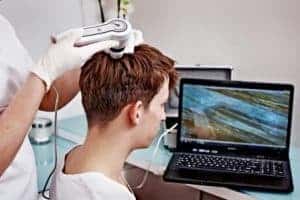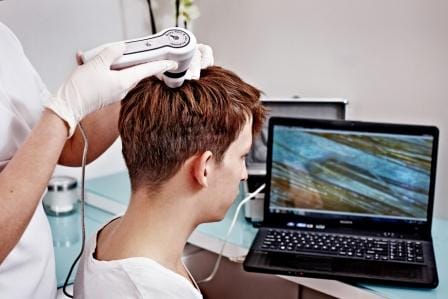A trichologist’s office, or so-called hair clinic, is a place where more and more frequently people go to deal with scalp disorders and complain about impaired hair condition. In what cases can this specialist help and how does a visit to a trychologist proceed?
Table of contents
Who is a trychologist and what does he do?

Hair doctors – this is how trichologists are commonly referred to, as their specialisation has recently become more and more popular. Trichology is one of the branches of dermatology (also related to cosmetology), whose task is to diagnose and treat various ailments of the scalp and hair. You can visit a trichologist if you suffer from psoriasis, seborrheic dermatitis, atopic dermatitis, dandruff and other hair diseases, as well as excessive oiliness, itching of the scalp, weakening of hair and damage to its structure. One of the most frequently treated by trichologists ailments is hair loss of various causes, including alopecia (androgenic, male, female, etc.).
What does a trichological examination look like?
The first stage of the visit at the trichologist’s is a thorough interview with the patient, during which the doctor asks questions about the patient’s past medical history, diet, general health condition, lifestyle, possible hormonal disorders, medications taken, hair care products used, etc. During the first visit the patient’s morphology results are also analysed. Based on the conversation and the results, the trichologist may order additional tests. The trichological examination involves viewing hair follicles under a microscope and observing the scalp and hair in close-up using a trichoscope. In some cases, the so-called elemental hair analysis is also performed.
Treatment at the trichologist
The choice of treatment method depends on the type of disease, its intensity and the individual condition of the patient. In case of seborrheic dermatitis and other fungal or bacterial disorders, drug treatment is often introduced in combination with properly selected skin care treatments. The treatment of hair loss can be carried out in different ways, among others: hormonal treatments, finasteride therapy, mesotherapy of the scalp, carboxytherapy, laser therapy, irradiation, dermaroller punctures, hair transplants, hair thickening with implants (you will read about this procedure in the next article).
In case of an initial or moderately advanced stage of androgenic alopecia, a visit to a trichologist does not have to be a necessity. Before you head to the office, it’s a good idea to try a home treatment with one of the leading anti-alopecia products. By reading this article you will learn more about Profolan, whose positive effects are confirmed by most men who use it.

